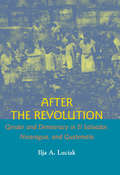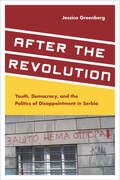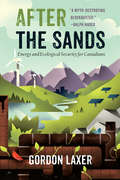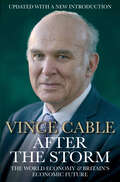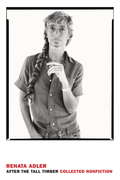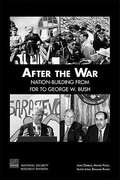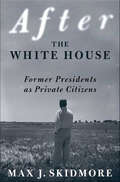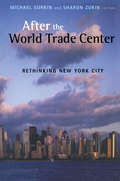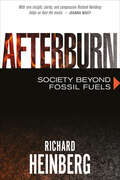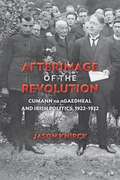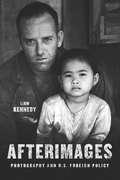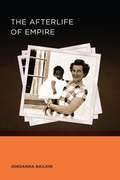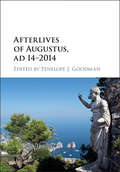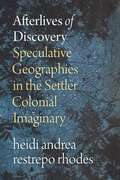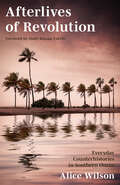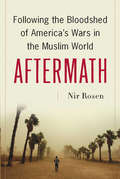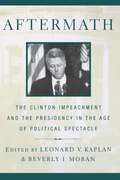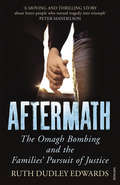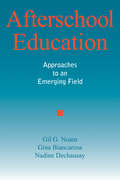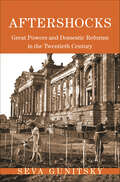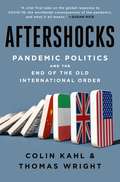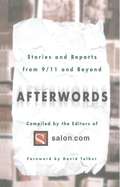- Table View
- List View
After the Revolution: Gender and Democracy in El Salvador, Nicaragua, and Guatemala
by Ilja A. LuciakHow women active in guerilla movements become active in politics after the war. Complements Bayard de Volo's Mothers, Heroes, Martyrs:Gender Identity Politics in Nicaragua, 1979–1999."Gender equality and meaningful democratization are inextricably linked," writes Ilja Luciak. "The democratization of Central America requires the full incorporation of women as voters, candidates, and office holders." In After the Revolution: Gender and Democracy in El Salvador, Nicaragua, and Guatemala, Luciak shows how former guerrilla women in three Central American countries made the transition from insurgents to mainstream political players in the democratization process.Examining the role of women in the various stages of revolutionary and national politics, Luciak begins with women as participants and leaders in guerrilla movements. Women contributed greatly to the revolutionary struggle in all three countries, but thereafter many similarities ended. In Guatemala, ideological disputes reduced women's political effectiveness at both the intra-party and national levels. In Nicaragua, although women's rights became a secondary issue for the revolutionary party, women were nonetheless able to put the issue on the national agenda. In El Salvador, women took leading roles in the revolutionary party and were able to incorporate women's rights into a broad reform agenda. Luciak cautions that while active measures to advance the political role of women have strengthened formal gender equality, only the joint efforts of both sexes can lead to a successful transformation of society based on democratic governance and substantive gender equality.
After the Revolution: Youth, Democracy, and the Politics of Disappointment in Serbia
by Jessica GreenbergWhat happens to student activism once mass protests have disappeared from view, and youth no longer embody the political frustrations and hopes of a nation? After the Revolution chronicles the lives of student activists as they confront the possibilities and disappointments of democracy in the shadow of the recent revolution in Serbia. Greenberg's narrative highlights the stories of young student activists as they seek to define their role and articulate a new form of legitimate political activity, post-socialism. When student activists in Serbia helped topple dictator Slobodan Milosevic on October 5, 2000, they unexpectedly found that the post-revolutionary period brought even greater problems. How do you actually live and practice democracy in the wake of war and the shadow of a recent revolution? How do young Serbians attempt to translate the energy and excitement generated by wide scale mobilization into the slow work of building democratic institutions? Greenberg navigates through the ranks of student organizations as they transition their activism from the streets back into the halls of the university. In exploring the everyday practices of student activists#151;their triumphs and frustrations#151;After the Revolution argues that disappointment is not a failure of democracy but a fundamental feature of how people live and practice it. This fascinating book develops a critical vocabulary for the social life of disappointment with the aim of helping citizens, scholars, and policymakers worldwide escape the trap of framing new democracies as doomed to failure.
After the Revolution: Youth, Democracy, and the Politics of Disappointment in Serbia
by Jessica GreenbergWhat happens to student activism once mass protests have disappeared from view, and youth no longer embody the political frustrations and hopes of a nation? After the Revolution chronicles the lives of student activists as they confront the possibilities and disappointments of democracy in the shadow of the recent revolution in Serbia. Greenberg's narrative highlights the stories of young student activists as they seek to define their role and articulate a new form of legitimate political activity, post-socialism. When student activists in Serbia helped topple dictator Slobodan Milosevic on October 5, 2000, they unexpectedly found that the post-revolutionary period brought even greater problems. How do you actually live and practice democracy in the wake of war and the shadow of a recent revolution? How do young Serbians attempt to translate the energy and excitement generated by wide scale mobilization into the slow work of building democratic institutions? Greenberg navigates through the ranks of student organizations as they transition their activism from the streets back into the halls of the university. In exploring the everyday practices of student activists#151;their triumphs and frustrations#151;After the Revolution argues that disappointment is not a failure of democracy but a fundamental feature of how people live and practice it. This fascinating book develops a critical vocabulary for the social life of disappointment with the aim of helping citizens, scholars, and policymakers worldwide escape the trap of framing new democracies as doomed to failure.
After the Sands
by Gordon LaxerAfter the Sands outlines a vision and a road map to transitioning Canada to a low-carbon society.Despite its oil abundance, with no strategic reserves, Canada is woefully unprepared for the next global oil supply crisis. There's no good reason for Canadians to use much more oil per capita than people in other sparsely populated, northern countries like Norway, Finland and Sweden-nations that use 27 to 39 percent less oil per person. In After the Sands, Alberta-based political economist Gordon Laxer proposes a bold strategy of deep conservation and a Canada-first perspective to ensure that all Canadians have sufficient energy at affordable prices.The most achievable way to gain energy security is to supply Canadians with their own oil, natural gas and renewable energy. And the best way to cut carbon emissions is by phasing out Canada's role as a carbon-fuel exporter.Canada has all the oil, gas and coal needed to transition to a low-carbon future. Remarkable hydro power resources give Canadians a large base of renewable energy, which can be expanded with wind, solar, geothermal and biomass. Few countries have these options in adequate quantities. But, as Laxer argues, Canada will not get there until we overcome the power of vested interests and untangle the trade agreements that block Canadians from secure and fair access to the nation's own energy resources.Impeccably researched, After the Sands is critical reading for anyone concerned with climate change and the future of Canada.
After the Storm: The World Economy and Britain's Economic Future
by Vince CableFrom the bestselling author of The Storm comes a fascinating insight into the state of the British economy from one of our leading politicians, who was at the heart of the coalition government. Vince Cable's bestselling book, The Storm, explored and explained the causes of the 2008 world economic crisis and how Britain should respond to the great challenges it brought. In After the Storm, Cable, who was Business Secretary in the 2010-2015 coalition government, provides a unique perspective on the state of the global financial markets and how the British economy has fared since 2008. Providing a previously unreported inside view of the Coalition, After the Storm offers a carefully considered perspective on how the British economy should be managed over the next decade and beyond. This timely book is a fascinating and urgent intervention from one of the key figures in British politics of the past two decades.
After the Tall Timber
by Michael Wolff Renata AdlerWhat is really going on here? For decades Renata Adler has been asking and answering this question with unmatched urgency. In her essays and long-form journalism, she has captured the cultural zeitgeist, distrusted the accepted wisdom, and written stories that would otherwise go untold. As a staff writer at The New Yorker from 1963 to 2001, Adler reported on civil rights from Selma, Alabama; on the war in Biafra, the Six-Day War, and the Vietnam War; on the Nixon impeachment inquiry and Congress; on cultural life in Cuba. She has also written about cultural matters in the United States, films (as chief film critic for The New York Times), books, politics, television, and pop music. Like many journalists, she has put herself in harm's way in order to give us the news, not the "news" we have become accustomed to--celebrity journalism, conventional wisdom, received ideas--but the actual story, an account unfettered by ideology or consensus. She has been unafraid to speak up when too many other writers have joined the pack. In this sense, Adler is one of the few independent journalists writing in America today.This collection of Adler's nonfiction draws on Toward a Radical Middle (a selection of her earliest New Yorker pieces), A Year in the Dark (her film reviews), and Canaries in the Mineshaft (a selection of essays on politics and media), and also includes uncollected work from the past two decades. The more recent pieces are concerned with, in her words, "misrepresentation, coercion, and abuse of public process, and, to a degree, the journalist's role in it." With a brilliant literary and legal mind, Adler parses power by analyzing language: the language of courts, of journalists, of political figures, of the man on the street. In doing so, she unravels the tangled narratives that pass for the resolution of scandal and finds the threads that others miss, the ones that explain what really is going on here--from the Watergate scandal, to the "preposterous" Kenneth Starr report submitted to the House during the Clinton impeachment inquiry, to the plagiarism and fabrication scandal of the former New York Times reporter Jayson Blair. And she writes extensively about the Supreme Court and the power of its rulings, including its fateful decision in Bush v. Gore.
After the War: Nation-building from FDR to George W. Bush
by James Dobbins Austin Long Michele A. Poole Benjamin RunkleFrom the post-World War II era through the Cold War, post-Cold War era, and current war on terrorism, this volume assesses how U.S. presidential decisionmaking style and administrative structure can work in favor of, as well as against, the nation-building goals of the U.S. government and military and those of its coalition partners and allies.
After the White House: Former Presidents as Private Citizens
by Max J. SkidmoreWhat exactly has Bill Clinton been doing since he left office? What can he expect to accomplish? What have his predecessors in his position done? Many presidents have had enormous impacts on the course of history after their terms ended, but not until After the White House by Max J. Skidmore has their role been examined. Thirty-two completed their terms. Four became presidential candidates again (one was even elected), two served in Congress, one abandoned his country to accept election to the Confederate Congress, one became Chief Justice, and one has the unique distinction of having his First Lady become a United States senator. Former presidents almost always remain influential, but their post-term activities have received little attention or scrutiny until now.
After the World Trade Center: Rethinking New York City (Cultural Spaces)
by Michael Sorkin Sharon ZukinThe terrorist attacks of September 11 have created an unprecedented public discussion about the uses and meanings of the central area of lower Manhattan that was once the World Trade Center. While the city sifts through the debris, contrary forces shaping its future are at work. Developers jockey to control the right to rebuild "ground zero." Financial firms line up for sweetheart deals while proposals for memorials are gaining in appeal. In After the World Trade Center, eminent social critics Sharon Zukin and Michael Sorkin call on New York's most acclaimed urbanists to consider the impact of the terrorist attack on the World Trade Center and what it bodes for the future of New York. Contributors take a close look at the reaction to the attack from a variety of New York communities and discuss possible effects on public life in the city.
Afterburn: Society Beyond Fossil Fuels
by Richard HeinbergEssential, visionary essays about our post-carbon future Climate change, along with the depletion of oil, coal, and gas dictate that we will inevitably move away from our profound societal reliance on fossil fuels; but just how big a transformation will this be? While many policy-makers assume that renewable energy sources will provide an easy "plug-and-play" solution, author Richard Heinberg suggests instead that we are in for a wild ride; a "civilization reboot" on a scale similar to the agricultural and industrial revolutions.Afterburn consists of 15 essays exploring various aspects of the 21st century migration away from fossil fuels including:Short-term political and economic factors that impede broad-scale, organized efforts to adaptThe origin of longer-term trends (such as consumerism), that have created a way of life that seems "normal" to most Americans, but is actually unprecedented, highly fragile, and unsustainablePotential opportunities and sources of conflict that are likely to emerge.From the inevitability and desirability of more locally organized economies, to the urgent need to preserve our recent cultural achievements and the futility of pursuing economic growth above all, Afterburn offers cutting-edge perspectives and insights that challenge conventional thinking about our present, our future, and the choices in our hands.AWARDSFINALIST | 2015 Foreword INDIES: Essays
Afterimage of the Revolution
by Jason KnirckAscending to power after the Anglo-Irish Treaty and a violent revolution against the United Kingdom, the political party Cumann na nGaedheal governed during the first ten years of the Irish Free State (1922-32). Taking over from the fallen Michael Collins and Arthur Griffith, Cumann na nGaedheal leaders such as W. T. Cosgrave and Kevin O'Higgins won a bloody civil war, created the institutions of the new Free State, and attempted to project abroad the independence of a new Ireland. In response to the view that Cumann na nGaedheal was actually a reactionary counterrevolutionary party, "Afterimage of the Revolution" contends that, in building the new Irish state, the government framed and promoted its policies in terms of ideas inherited from the revolution. In particular, Cumann na nGaedheal emphasized Irish sovereignty, the "Irishness" of the new state, and a strong sense of anticolonialism, all key components of the Sinn Fein party platform during the revolution. Jason Knirck argues that the 1920s must be understood as part of a continuing Irish revolution that led to an eventual independent republic. Drawing on state documents, newspapers, and private papers--including the recently released papers of Kevin O'Higgins--he offers a fresh view of Irish politics in the 1920s and integrates this period more closely with the Irish Revolution.
Afterimages
by Liam KennedyIn 2005, photographer Chris Hondros captured a striking image of a young Iraqi girl in the aftermath of the killing of her parents by American soldiers. The shot stunned the world and has since become iconic--comparable to the infamous photo by Nick Ut of a Vietnamese girl running from a napalm attack. Both images serve as microcosms for their respective conflicts. Afterimages looks at the work of war photographers like Hondros and Ut to understand how photojournalism interacts with the American worldview. Liam Kennedy here maps the evolving relations between the American way of war and photographic coverage of it. Organized in its first section around key US military actions over the last fifty years, the book then moves on to examine how photographers engaged with these conflicts on wider ethical and political grounds, and finally on to the genre of photojournalism itself. Illustrated throughout with examples of the photographs being considered, Afterimages argues that photographs are important means for critical reflection on war, violence, and human rights. It goes on to analyze the high ethical, sociopolitical, and legalistic value we place on the still image's ability to bear witness and stimulate action.
Afterlife of Empire (Berkeley Series in British Studies #4)
by Jordanna BailkinThe Afterlife of Empire is an award-winning investigation on how decolonization transformed British society in the 1950s and 1960s. Although usually charted through its diplomatic details, the collapse of the British empire was also a deeply personal process that altered everyday life, restructuring routines, individual relationships, and social interactions. The book traces a set of diverse yet interrelated and richly compelling stories: West Indian migrants repatriated for mental illness, young Britons volunteering in the former colonies, overseas students seeking higher education, polygamous husbands and wives facing invalidation of their marriages, West African children raised by white, working-class British families, and Irish deportees suspected of terrorism. Postwar welfare–from mental health to child care–was never simply a British story, but was shaped by global forces, from the experiences and expectations of individual migrants to the emergence of new legal regimes in Africa and Asia. The book thus recasts the genealogy and geography of welfare by charting its unseen dependence on the end of empire. Using a wealth of recently declassified files from the National Archives, oral histories, court cases, press reports, social science writings, and photographs, Jordanna Bailkin illuminates the relationship between the postwar and the postimperial. The Afterlife of Empire is the winner of several notable prizes including The Morris D. Forkosch Prize from the American Historical Association, the Stansky Book Prize from the North American Conference on British Studies, and the 2013 Biennial Book Prize from the Pacific Conference on British Studies.
Afterlives of Augustus, AD 14–2014
by Penelope J. GoodmanThe bi-millennium of Augustus' death on 19 August 2014 commemorated not only the end of his life but also the beginning of a two-thousand-year reception history. This volume addresses the range and breadth of that history. <P><P>Beginning with the Emperor's death and continuing through Late Antiquity, Early Christianity, the Middle Ages, the Renaissance and early modernity to the present day, chapters address political positioning, religious mythologisation, philosophy, rhetoric, narratives, memory, and material embodiment. As they collectively reveal, Augustus has meant radically different things from one time and place to another, and even to some individual commentators as the circumstances around them changed. The weight of established narratives has often also shaped those of subsequent generations, with or without their conscious awareness. The book outlines and analyses the major themes in Augustus' reception history, clarifying the cultural and historiographical issues at stake and providing a platform for further scholarship.<P> Gives a holistic view of Augustus' reception history from his death to the present day.<P> Demonstrates how much assessments of Augustus have always depended on the values and experiences of the viewer.<P> Uses the post-Classical receptions material at the heart of the book to cast valuable light back on the study of the historical Augustus.
Afterlives of Discovery: Speculative Geographies in the Settler Colonial Imaginary
by heidi andrea rhodesIn Afterlives of Discovery, heidi andrea restrepo rhodes traces global and national histories as they entangle through the concept and material life of Discovery across Colombia’s evolution into a liberal settler colonial state. Rather than seeing Discovery as a singular event or bygone era, rhodes theorizes Discovery as a globally encompassing, racialized formation of domination and geographic speculation that continues to structure settler colonialism. Discovery’s logics, they argue, are rooted in colonial and capitalist fantasies projected onto the racialized space and place of the colonized other. rhodes draws on critical theory, human rights research, and Colombian archives to challenge dominant narratives that maintain the Colombian armed conflict began as a Marxist insurgency in 1964. Instead, rhodes shows that the conflict is an extension of Discovery’s ongoingness via projects of dispossession, extraction, whitening, and epistemic and political hegemony. Given that Colombia’s national past, present, and future are grounded in Discovery, rhodes asks: How is it possible to build futures that escape Discovery’s grasp?
Afterlives of Revolution: Everyday Counterhistories in Southern Oman
by Alice WilsonThe Dhufar Revolution was fought between 1965–1976, in an attempt to depose Oman's British-backed Sultan and advance social ideals of egalitarianism and gender equality. Dhufar, the southernmost governorate in today's Sultanate, captured global attention for its revolutionaries and their liberation movement's Marxist-inspired social change. But following counterinsurgency victory, Oman's government expunged the revolution from sanctioned historical narratives. Afterlives of Revolution offers a groundbreaking study of the legacies of officially silenced revolutionaries. How do their underlying convictions survive and inspire platforms for progressive politics in the wake of disappointment, defeat, and repression? Alice Wilson considers the "social afterlives" of revolutionary values and networks. Veteran militants have used kinship and daily socializing to reproduce networks of social egalitarianism and commemorate the revolution in unofficial ways. These afterlives revise conventional wartime and postwar histories. They highlight lasting engagement with revolutionary values, the agency of former militants in postwar modernization, and the limitations of government patronage for eliciting conformity. Recognizing that those typically depicted as coopted can still reproduce counterhegemonic values, this book considers a condition all too common across Southwest Asia and North Africa: the experience of defeated revolutionaries living under the authoritarian state they once contested.
Aftermath of the CFA Franc Devaluation
by Jean A.P. Clément Johannes Mueller Stéphane Cossé Jean Le DemFinancial report from the IMF
Aftermath: Following the Bloodshed of America's Wars in the Muslim World
by Nir RosenAs Iraq confronts a bleak and uncertain future and instability spreads throughout the region, an award winning journalist describes the new shape of the Middle East
Aftermath: The Clinton Impeachment and the Presidency in the Age of Political Spectacle (Critical America #7)
by Leonard V. KaplanWith the specter of prosecution after his term is over and the possibility of disbarment in Arkansas hanging over President Clinton, the Clinton-Lewinsky scandal and the events that have followed it show no sign of abating. The question has become what to do, and how to think, about those eight months. Did the President lie or was it plausible that he had truthfully testified to no sexual relationship? Was the job search for Monica just help for a friend or a sinister means of obtaining silence? Even if all the charges were true, did impeachment follow or was censure enough? And what are the lasting repercussions on the office of the Presidency? Aftermath: The Clinton Impeachment and the Presidency in the Age of Political Spectacle takes a multi-disciplinary approach to analyze the Clinton impeachment from political perspectives across the spectrum. The authors attempt to tease out the meanings of the scandal from the vantage point of law, religion, public opinion, and politics, both public and personal. Further, the impeachment itself is situated broadly within the contemporary American liberal state and mined for the contradictory possibilities for reconciliation it reveals in our culture. Contributors: David T. Canon, John Cooper, Drucilla Cornell, Jean Bethke Elshtain, Robert W. Gordon, Lawrence Joseph, Leonard V. Kaplan, David Kennedy, Kenneth R. Mayer, Beverly I. Moran, Father Richard John Neuhaus, David Novak, Linda Denise Oakley, Elizabeth Rapaport, Lawrence Rosen, Eric Rothstein, Aviam Soifer, Lawrence M. Solan, Cass R. Sunstein, Stephen Toulmin, Leon Trakman, Frank Tuerkheimer, Mark V. Tushnet, Andrew D. Weiner, Robin L. West.
Aftermath: The Omagh Bombing and the Families' Pursuit of Justice
by Ruth Dudley EdwardsOn Saturday 15th August, 1998, a massive bomb placed by the so-called Real IRA ripped through the town of Omagh, killing twenty-nine people, including eleven children, and injuring over two hundred. It was the worst massacre in Northern Ireland's modern history- yet from it came a most extraordinary tale of human resilience, as the families of ten of the dead channelled their grief into action.Taking for their motto, 'For evil to triumph, all that is necessary is for good men to do nothing', they decided to pursue the men whom the police believed responsible for the atrocity through the civil courts, where the burden of proof is lower. This is the remarkable account of how these families- who had no knowledge of the law and no money- became internationally recognised, formiddable campaigners and surmounted countless daunting obstacles to win a famous victory.Longlisted for the Orwell Prize 2010
Afterschool Education: Approaches to an Emerging Field
by Gil G. Noam Gina Biancarosa Nadine DechausayThe authors survey the current afterschool landscape and bring to light important issues and practices within the field, explore the challenges and opportunities facing afterschool education programs, and point to future directions for these burgeoning educational ventures. Afterschool education has grown in recent years into a vast and diverse enterprise. In the United States, young people spend almost a third of their organized time (including school hours) in afterschool and summer programs. Yet there is little clear and conclusive research on afterschool programs—research that would help guide the practice of existing afterschool programs and establish guidelines for the creation of new programs. An indispensable guide for practitioners, administrators, policy makers, and parents, Afterschool Education will serve as the cornerstone for all future accounts of and proposals for this crucial educational field.
Aftershock: Anti-Zionism & Anti-Semitism
by David MatasVerbal attacks against Israel for human rights violations have turned into physical attacks against the Jewish community worldwide. How has that happened? This book attempts to explain the phenomenon. Anti-Zionists, whose primary goal is destruction of the State of Israel, use accusations of the worst forms of human rights violations against Israel to delegitimize the state. These accusations criminalize the Jewish population worldwide for actual or presumed support of the State of Israel. The contemporary international human rights system and the existence of the State of Israel are twin legacies of the Holocaust. The failure of the human rights system to prevent attacks on Israel and the Jews is an aftershock of the Holocaust.
Aftershocks: Great Powers and Domestic Reforms in the Twentieth Century (Princeton Studies in International History and Politics)
by Seva GunitskyOver the past century, democracy spread around the world in turbulent bursts of change, sweeping across national borders in dramatic cascades of revolution and reform. Aftershocks offers a new global-oriented explanation for this wavelike spread and retreat—not only of democracy but also of its twentieth-century rivals, fascism and communism.Seva Gunitsky argues that waves of regime change are driven by the aftermath of cataclysmic disruptions to the international system. These hegemonic shocks, marked by the sudden rise and fall of great powers, have been essential and often-neglected drivers of domestic transformations. Though rare and fleeting, they not only repeatedly alter the global hierarchy of powerful states but also create unique and powerful opportunities for sweeping national reforms—by triggering military impositions, swiftly changing the incentives of domestic actors, or transforming the basis of political legitimacy itself. As a result, the evolution of modern regimes cannot be fully understood without examining the consequences of clashes between great powers, which repeatedly—and often unsuccessfully—sought to cajole, inspire, and intimidate other states into joining their camps.
Aftershocks: Pandemic Politics and the End of the Old International Order
by Thomas Wright Colin KahlTwo of America's leading national security experts offer a definitive account of the global impact of COVID-19 and the political shock waves it will have on the United States and the world order in the 21st Century. “Informed by history, reporting, and a truly global perspective, this is an indispensable first draft of history and blueprint for how we can move forward.” —Ben RhodesThe COVID-19 pandemic killed millions, infected hundreds of millions, and laid bare the deep vulnerabilities and inequalities of our interconnected world. The accompanying economic crash was the worst since the Great Depression, with the International Monetary Fund estimating that it will cost over $22 trillion in global wealth over the next few years. Over two decades of progress in reducing extreme poverty was erased, just in the space of a few months. Already fragile states in every corner of the globe were further hollowed out. The brewing clash between the United States and China boiled over and the worldwide contest between democracy and authoritarianism deepened. It was a truly global crisis necessitating a collective response—and yet international cooperation almost entirely broke down, with key world leaders hardly on speaking terms.Colin Kahl and Thomas Wright's Aftershocks offers a riveting and comprehensive account of one of the strangest and most consequential years on record. Drawing on interviews with officials from around the world and extensive research, the authors tell the story of how nationalism and major power rivalries constrained the response to the worst pandemic in a century. They demonstrate the myriad ways in which the crisis exposed the limits of the old international order and how the reverberations from COVID-19 will be felt for years to come.
Afterwords: Stories and Reports from 9/11 and Beyond
by David TalbotAFTER September 11, 2001, emotions couldn't be clearly defined. There were no WORDS strong enough to justify, avenge, explain, or express the sheer magnitude of this horrifyingly unique moment in history. In this remarkable anthology, compiled by Salon.com's award-winning editorial team, Rick Moody, Janet Fitch, Caroline Knapp, and Jeffrey Eugenides join many contemporary literary talents and reporters in giving a voice to the day that left a stunning roar of silence across America. Dread, fear, heroism, and dignity color these pages from eyewitness accounts of ordinary citizens turned rescue workers, to an escape from the World Trade Center, a report on everyday New Yorkers finding comfort in "terror sex," and stories of miracles in the madness -- like that of a blind man led by his seeing-eye dog down eighty-seven flights of stairs to safety. Afterwords also probes the aftermath of the attacks on the nation and the world's cultural, political, and social fabric through writing ranging from an in-depth interview with controversial social critic Noam Chomsky, to a female Pakistani-American journalist's meeting with a Taliban leader and his wives, and essays on how sheer horror gave way to heartening solidarity, macabre spectacle, and kitschy sentimentality. Immediate, raw, emotional, and empowering, this outstanding collection speaks brilliantly to the simple need to remember and comprehend what happened against that perfect blue sky on September 11, 2001. A portion of the royalties will be donated to the Twin Towers Fund and the Red Cross's Fund for Afghan Children.
